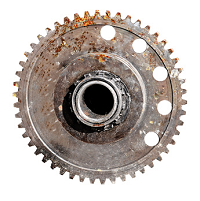Metalworking Fluid: Corrosion on Machined Components
 Initial days of my career I use to work as a Production Supervisor of a medium size Auto component manufacturing company having 10 CNC turning machines and 5 odd Vertical machining centers. It was an early morning, I was on my desk waiting for my first cup of tea for the day and the phone rings loud. It was the Quality Control Manager, before I could wish him Good Morning he orders "I want you in my office right now." I gathered all the courage and reached his desk. To my surprise there were 5 pallets of machined components lying in front which I produced yesterday and all of them were rejected. The reason was “CORROSION” and I was asked for the detailed report why this happened? Very first thing I did was to call the metalworking fluid supplier and doubly spoiled his morning. And second obvious thing decided to change the metalworking fluid supplier. But did It solve the problem? Off course NOT.
Initial days of my career I use to work as a Production Supervisor of a medium size Auto component manufacturing company having 10 CNC turning machines and 5 odd Vertical machining centers. It was an early morning, I was on my desk waiting for my first cup of tea for the day and the phone rings loud. It was the Quality Control Manager, before I could wish him Good Morning he orders "I want you in my office right now." I gathered all the courage and reached his desk. To my surprise there were 5 pallets of machined components lying in front which I produced yesterday and all of them were rejected. The reason was “CORROSION” and I was asked for the detailed report why this happened? Very first thing I did was to call the metalworking fluid supplier and doubly spoiled his morning. And second obvious thing decided to change the metalworking fluid supplier. But did It solve the problem? Off course NOT.
It was not only me; rough estimates peg the annual costs of corrosion only to U.S. industry at greater than $300 billion. Corrosion, commonly referred to as rust, is an electrochemical reaction between a substrate – typically a metal surface – and its environment. Metalworking fluids generally provide corrosion protection by blocking oxygen or moisture from the metal surface. This is commonly accomplished by utilizing organic, polar molecules to adhere to the metal surface, or by leaving a residual film coating.
For manufacturers, costs associated with corrosion stem from re-work, scrap, downtime, reduced machine tool and component longevity, lost sales and damaged customer relations.
Let’s try to analyze the problem MWFMAG way with respect to various different aspects involved. What can be probable causes involved and remedy for components getting rusted?
Cause :
- Concentration: The first thing to investigate, even before calling your metalworking fluid supplier, is the concentration. In more than 50% cases it’s the cause. Using costly metalworking fluid products does not mean using less.
- Water: The root cause of corrosion is here. After all its 95% water in the emulsion. Check the source first followed by complete water chemistry pH, TDS (Total Dissolved Solids), Chloride level, etc. Best is get the water tested from a reliable laboratory and have a certificate for fitness of use in with your MWF.
- Contamination: How frequently do we remove all machined chips, debris, metal fines and dust which are accumulated at the bottom of the tank? They are one of the reasons to spoil the fluid and making it more vulnerable.
- Right Metalworking Fluid Selection: Whatever may be the make re-check with your manufacturer is it the right selection for given material and application. The formulator always has these things in mind while designing a product. All products can not be “Universal.”
- Compatibility: Fluid’s compatibility with system oils ( Slide way oil/ Spindle oil/ Hydraulic Oils, etc) is always a concern, get it verified.
- Others : There are many other reasons which we might not even notice and consider like wet parts in contact with one another, Hot Humid atmospheric conditions, Acid fumes from other plant operations
MWFMAG Conclusion: It’s easy to blame metalworking fluid for corrosion, rightly so after all we are paying them for protecting our machined components. But it’s not always that they are at fault. Keep your eyes open, follow few basic things to maintain fluid health and avoid corrosion.
Check our Directoies for a list of experts available at your help: Fluid Management, Consultants


